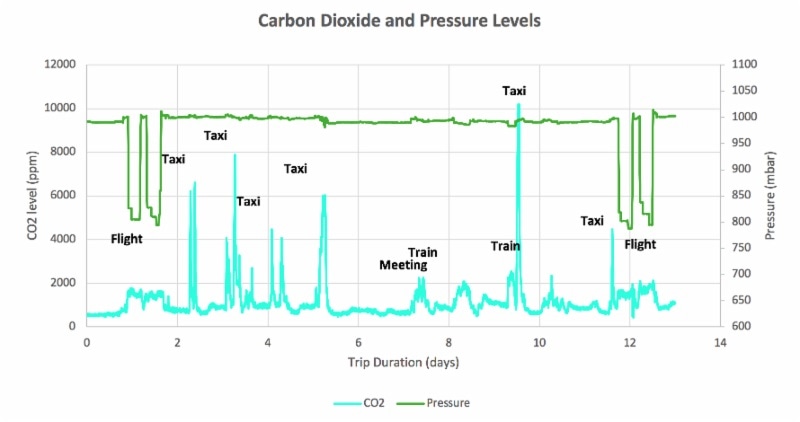CO2 sensor specialists, Gas Sensing Solutions (GSS), took a CO2 datalogger on a business trip from Scotland to Asia to see how the levels of CO2 changed on different modes of transport throughout the journey. Surprised by how high levels were on occasions, GSS will be doing further investigations in other locations to see how CO2 levels vary in the real world.

The datalogger used measures CO2 concentration, air pressure and temperature along with relative humidity every few minutes. It is a custom solution designed and built by GSS and uses one of its low power, ambient air, CozIR®-A 5000 sensors. This low power consumption enabled the datalogger to record over a 2-week period without needing a change of battery. The other sensors are an NXP MPL3115A2 pressure sensor and a Sensirion SHT21 temperature and humidity sensor.
The graph shows how the CO2 level in blue and the air pressure level in green fluctuated throughout the journey. It clearly shows increased levels of CO2 when there are a number of people in a confined space with limited ventilation to remove CO2 build up. The World Health Organisation1 guideline is that CO2 levels should be below 1000 ppm, and ASHRAE (the American Society of Heating, Refrigeration and Air Conditioning Engineers) says that CO2 at high concentrations of 5000 ppm can pose a health risk2.
The drop in air pressure on the graph shows the part of the journey that was in a plane. The train journeys show particularly high levels of CO2, where CO2 levels built up to over 2000 ppm. Similar results are shown from the meeting room. However, perhaps surprisingly the highest CO2 peaks were during the taxi journeys with two passengers and a driver. This consistently produced levels in excess of the 5000 ppm health risk indicator mark2 - and, at one point of the journey, even peaked at 10,000 ppm. This really shows the high levels of CO2 that people can be exposed to while driving through a busy city.
"Generally, people are still not aware of the problems of high CO2 concentrations," said Dr David Moodie, Technical Manager at GSS. "That drowsy sensation you often experience in a stuffy meeting room is caused by elevated levels of CO2. The higher the level and the longer the exposure, the more apparent the effect is on the body. Travelling can often be tiring, leaving you feeling worn out. This real-world data shows how often you can be exposed to high levels of CO2 without realising it - even in taxis and trains - and this could be a significant factor in how you feel. So, my advice is to open windows whenever possible to let the CO2 out. Naturally that does not apply on planes!"
1) https://consult.education.gov.uk/capital/bb101-school-design-iaq-comfort-and-ventilation/supporting_documents/DfE%20Ventilation%20guide%20consultation%20draft%2029%2006%202016.pdf
2) https://www.ashrae.org/File%20Library/Technical%20Resources/Technical%20FAQs/TC-04.03-FAQ-35.pdf